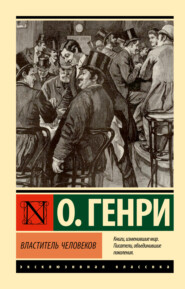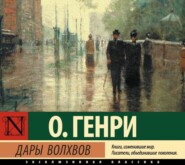По всем вопросам обращайтесь на: info@litportal.ru
(©) 2003-2025.
✖
Options
Настройки чтения
Размер шрифта
Высота строк
Поля
"Every man," said he, with some dignity, "has got his lamps on something that looks good to him. With you, it's this dame that you're afraid to say your say to. With me, it was to win out in the ring. Well, you'll lose just like I did."
"Why do you think I shall lose?" I asked warmly.
"'Cause," said he, "you're afraid to go in the ring. You dassen't stand up before a professional. Your case and mine is just the same. You're a amateur; and that means that you'd better keep outside of the ropes."
"Well, I must be going," I said, rising and looking with elaborate care at my watch.
When I was twenty feet away the park-bencher called to me.
"Much obliged for the dollar," he said. "And for the dime. But you'll never get 'er. You're in the amateur class."
"Serves you right," I said to myself, "for hobnobbing with a tramp. His impudence!"
But, as I walked, his words seemed to repeat themselves over and over again in my brain. I think I even grew angry at the man.
"I'll show him!" I finally said, aloud. "I'll show him that I can fight Reddy Burns, too – even knowing who he is."
I hurried to a telephone-booth and rang up the Telfair residence.
A soft, sweet voice answered. Didn't I know that voice? My hand holding the receiver shook.
"Is that you?" said I, employing the foolish words that form the vocabulary of every talker through the telephone.
"Yes, this is I," came back the answer in the low, clear-cut tones that are an inheritance of the Telfairs. "Who is it, please?"
"It's me," said I, less ungrammatically than egotistically. "It's me, and I've got a few things that I want to say to you right now and immediately and straight to the point."
"Dear me," said the voice. "Oh, it's you, Mr. Arden!"
I wondered if any accent on the first word was intended; Mildred was fine at saying things that you had to study out afterward.
"Yes," said I. "I hope so. And now to come down to brass tacks." I thought that rather a vernacularism, if there is such a word, as soon as I had said it; but I didn't stop to apologize. "You know, of course, that I love you, and that I have been in that idiotic state for a long time. I don't want any more foolishness about it – that is, I mean I want an answer from you right now. Will you marry me or not? Hold the wire, please. Keep out, Central. Hello, hello! Will you, or will you not?"
That was just the uppercut for Reddy Burns' chin. The answer came back:
"Why, Phil, dear, of course I will! I didn't know that you – that is, you never said – oh, come up to the house, please – I can't say what I want to over the 'phone. You are so importunate. But please come up to the house, won't you?"
Would I?
I rang the bell of the Telfair house violently. Some sort of a human came to the door and shooed me into the drawing-room.
"Oh, well," said I to myself, looking at the ceiling, "any one can learn from any one. That was a pretty good philosophy of Mack's, anyhow. He didn't take advantage of his experience, but I get the benefit of it. If you want to get into the professional class, you've got to – "
I stopped thinking then. Some one was coming down the stairs. My knees began to shake. I knew then how Mack had felt when a professional began to climb over the ropes.
I looked around foolishly for a door or a window by which I might escape. If it had been any other girl approaching, I mightn't have —
But just then the door opened, and Bess, Mildred's younger sister, came in. I'd never seen her look so much like a glorified angel. She walked straight tip to me, and – and —
I'd never noticed before what perfectly wonderful eyes and hair Elizabeth Telfair had.
"Phil," she said, in the Telfair, sweet, thrilling tones, "why didn't you tell me about it before? I thought it was sister you wanted all the time, until you telephoned to me a few minutes ago!"
I suppose Mack and I always will be hopeless amateurs. But, as the thing has turned out in my case, I'm mighty glad of it.
BEST-SELLER
I
One day last summer I went to Pittsburgh – well, I had to go there on business.
My chair-car was profitably well filled with people of the kind one usually sees on chair-cars. Most of them were ladies in brown-silk dresses cut with square yokes, with lace insertion, and dotted veils, who refused to have the windows raised. Then there was the usual number of men who looked as if they might be in almost any business and going almost anywhere. Some students of human nature can look at a man in a Pullman and tell you where he is from, his occupation and his stations in life, both flag and social; but I never could. The only way I can correctly judge a fellow-traveller is when the train is held up by robbers, or when he reaches at the same time I do for the last towel in the dressing-room of the sleeper.
The porter came and brushed the collection of soot on the window-sill off to the left knee of my trousers. I removed it with an air of apology. The temperature was eighty-eight. One of the dotted-veiled ladies demanded the closing of two more ventilators, and spoke loudly of Interlaken. I leaned back idly in chair No. 7, and looked with the tepidest curiosity at the small, black, bald-spotted head just visible above the back of No. 9.
Suddenly No. 9 hurled a book to the floor between his chair and the window, and, looking, I saw that it was "The Rose-Lady and Trevelyan," one of the best-selling novels of the present day. And then the critic or Philistine, whichever he was, veered his chair toward the window, and I knew him at once for John A. Pescud, of Pittsburgh, travelling salesman for a plate-glass company – an old acquaintance whom I had not seen in two years.
In two minutes we were faced, had shaken hands, and had finished with such topics as rain, prosperity, health, residence, and destination. Politics might have followed next; but I was not so ill-fated.
I wish you might know John A. Pescud. He is of the stuff that heroes are not often lucky enough to be made of. He is a small man with a wide smile, and an eye that seems to be fixed upon that little red spot on the end of your nose. I never saw him wear but one kind of necktie, and he believes in cuff-holders and button-shoes. He is as hard and true as anything ever turned out by the Cambria Steel Works; and he believes that as soon as Pittsburgh makes smoke-consumers compulsory, St. Peter will come down and sit at the foot of Smithfield Street, and let somebody else attend to the gate up in the branch heaven. He believes that "our" plate-glass is the most important commodity in the world, and that when a man is in his home town he ought to be decent and law-abiding.
During my acquaintance with him in the City of Diurnal Night I had never known his views on life, romance, literature, and ethics. We had browsed, during our meetings, on local topics, and then parted, after Chateau Margaux, Irish stew, flannel-cakes, cottage-pudding, and coffee (hey, there! – with milk separate). Now I was to get more of his ideas. By way of facts, he told me that business had picked up since the party conventions, and that he was going to get off at Coketown.
II
"Say," said Pescud, stirring his discarded book with the toe of his right shoe, "did you ever read one of these best-sellers? I mean the kind where the hero is an American swell – sometimes even from Chicago – who falls in love with a royal princess from Europe who is travelling under an alias, and follows her to her father's kingdom or principality? I guess you have. They're all alike. Sometimes this going-away masher is a Washington newspaper correspondent, and sometimes he is a Van Something from New York, or a Chicago wheat-broker worthy fifty millions. But he's always ready to break into the king row of any foreign country that sends over their queens and princesses to try the new plush seats on the Big Four or the B. and O. There doesn't seem to be any other reason in the book for their being here.
"Well, this fellow chases the royal chair-warmer home, as I said, and finds out who she is. He meets her on the corso or the strasse one evening and gives us ten pages of conversation. She reminds him of the difference in their stations, and that gives him a chance to ring in three solid pages about America's uncrowned sovereigns. If you'd take his remarks and set 'em to music, and then take the music away from 'em, they'd sound exactly like one of George Cohan's songs.
"Well, you know how it runs on, if you've read any of 'em – he slaps the king's Swiss body-guards around like everything whenever they get in his way. He's a great fencer, too. Now, I've known of some Chicago men who were pretty notorious fences, but I never heard of any fencers coming from there. He stands on the first landing of the royal staircase in Castle Schutzenfestenstein with a gleaming rapier in his hand, and makes a Baltimore broil of six platoons of traitors who come to massacre the said king. And then he has to fight duels with a couple of chancellors, and foil a plot by four Austrian archdukes to seize the kingdom for a gasoline-station.
"But the great scene is when his rival for the princess' hand, Count Feodor, attacks him between the portcullis and the ruined chapel, armed with a mitrailleuse, a yataghan, and a couple of Siberian bloodhounds. This scene is what runs the best-seller into the twenty-ninth edition before the publisher has had time to draw a check for the advance royalties.
"The American hero shucks his coat and throws it over the heads of the bloodhounds, gives the mitrailleuse a slap with his mitt, says 'Yah!' to the yataghan, and lands in Kid McCoy's best style on the count's left eye. Of course, we have a neat little prize-fight right then and there. The count – in order to make the go possible – seems to be an expert at the art of self-defence, himself; and here we have the Corbett-Sullivan fight done over into literature. The book ends with the broker and the princess doing a John Cecil Clay cover under the linden-trees on the Gorgonzola Walk. That winds up the love-story plenty good enough. But I notice that the book dodges the final issue. Even a best-seller has sense enough to shy at either leaving a Chicago grain broker on the throne of Lobsterpotsdam or bringing over a real princess to eat fish and potato salad in an Italian chalet on Michigan Avenue. What do you think about 'em?"
"Why," said I, "I hardly know, John. There's a saying: 'Love levels all ranks,' you know."
"Yes," said Pescud, "but these kind of love-stories are rank – on the level. I know something about literature, even if I am in plate-glass. These kind of books are wrong, and yet I never go into a train but what they pile 'em up on me. No good can come out of an international clinch between the Old-World aristocracy and one of us fresh Americans. When people in real life marry, they generally hunt up somebody in their own station. A fellow usually picks out a girl that went to the same high-school and belonged to the same singing-society that he did. When young millionaires fall in love, they always select the chorus-girl that likes the same kind of sauce on the lobster that he does. Washington newspaper correspondents always many widow ladies ten years older than themselves who keep boarding-houses. No, sir, you can't make a novel sound right to me when it makes one of C. D. Gibson's bright young men go abroad and turn kingdoms upside down just because he's a Taft American and took a course at a gymnasium. And listen how they talk, too!"
Pescud picked up the best-seller and hunted his page.
"Listen at this," said he. "Trevelyan is chinning with the Princess Alwyna at the back end of the tulip-garden. This is how it goes:
"'Say not so, dearest and sweetest of earth's fairest flowers. Would I aspire? You are a star set high above me in a royal heaven; I am only – myself. Yet I am a man, and I have a heart to do and dare. I have no title save that of an uncrowned sovereign; but I have an arm and a sword that yet might free Schutzenfestenstein from the plots of traitors.'
"Think of a Chicago man packing a sword, and talking about freeing anything that sounded as much like canned pork as that! He'd be much more likely to fight to have an import duty put on it."
"I think I understand you, John," said I. "You want fiction-writers to be consistent with their scenes and characters. They shouldn't mix Turkish pashas with Vermont farmers, or English dukes with Long Island clam-diggers, or Italian countesses with Montana cowboys, or Cincinnati brewery agents with the rajahs of India."

















